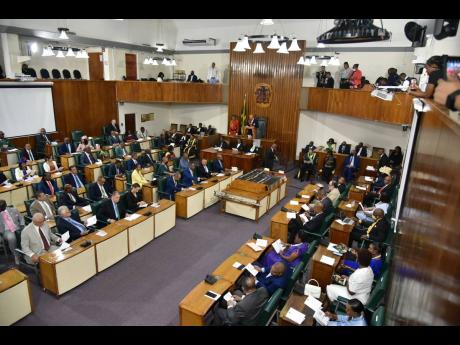Rosalea Hamilton | Jamaica’s Constitutional Reform: A deeper look at the process
Jamaica’s history of trying to reform our Constitution has been a long and winding road. There have been many potholes in the road of the Jamaican people’s struggle to improve their living conditions and to find a legal framework to support their rights, freedom and self-determination in doing so. The current pothole has emerged due to the refusal of the Opposition leader to sign off on the secret Final Report of the Constitutional Reform Committee (CRC) submitted to the Cabinet on May 13.
However, a deeper look will reveal that the process was inherently flawed. In the absence of a people-centric approach to constitution-making, the people and their representatives in Parliament were sidelined in the process. The focus has become the opposing views of the two major political parties about the removal of the Judicial Committee of the Privy Council (JCPC) as Jamaica’s final appellate court. Throughout the process the absence of a meaningful public engagement has been a major flaw. Despite well-meaning, concerted efforts to address many problems that emerged, the inherent flaws were never adequately addressed. It contributed to public cynicism – “nutting a cum out a dat.” I remain optimistic that something can!
SOME BACKGROUND
The start of the process can be traced to the decision to establish a Ministry of Legal and Constitutional Affairs (MLCA), even though a Legislative & Constitutional Reform Programme was one of the priority programmes in the Ministry of Justice in 2018. The rationale to establish another ministry to do this important work was to:
“…take charge of and give focused attention to the Government of Jamaica’s (GOJ) legislative agenda and its legal and constitutional reform aspirations, and specifically, to spearhead the most meaningful and comprehensive post-Independence constitutional reform work to be undertaken in Jamaica.”
This is an important rationale for the Government of Jamaica’s (GOJ) decision to establish the MLCA and to fund it with $2.5 bill of taxpayers’ money. With work on the constitutional reform process starting in 2021, Minister Malahoo Forte was sworn in as minister for the MLCA on January 11, 2022. In her statement to the House of Representatives on January 18, 2022, she said that the new ministry “may be regarded as the first serious attempt by any Head of Government, to revisit, holistically, the legal and constitutional infrastructure of the Jamaica nation state”. I applaud the GOJ for this ambitious and necessary undertaking!
By March 23, 2022, PM Holness famously announced to the Duke and Duchess of Cambridge that: “…we are moving on, and we intend to attain, in short order, our development goals and fulfil our true ambitions and destiny as an independent, developed, prosperous country.” What did the PM mean by “our true ambitions and destiny?” Is it to become a “Republic?” Days earlier, PM Holness told Parliament that an advisory committee would be established to lead Jamaica away from a “constitutional monarchy” to a “Republic”. In the absence of a meaningful public engagement to clarify these and other questions, the past two 2½ years can be seen as a missed opportunity to bring the GOJ and the people together around the idea of moving to a Jamaican Republic.
On March 1, 2023, the CRC was announced with the purpose “to assist in providing expert guidance and oversight to the Government and people of Jamaica during the constitutional reform process”. On April 17, 2023, after five CRC meetings, Minister Malahoo Forte announced that the CRC had reached a consensus.
A FLAWED PROCESS
In response to this announce consensus, a firestorm of public criticism was unleashed and has persisted to date. Criticisms included:
1. The absence of a meaningful public engagement process.
2. A flawed consultation process inconsistent with the 2005 Consultation Code of Practice for the Public Sector.
3. Lack of transparency in the work of the CRC, including how contributions from the public would be treated in the Final Report, the process of compiling the Report and the secret Final Report.
4. Executive chairmanship of the CRC contributed to the politicisation of the process.
5. Politically handpicked sector representatives with limited resources and framework to adequately dialogue with, and be informed by, the sectors they represented, and the absence of representation of some groups who felt excluded.
6. The Cabinet’s disregard for the CRC and the Jamaican people by changing s.96(1) and s.121(1) of the Constitution to extend the term of office of the DPP and Auditor General without reference to the CRC in July 2023. This has significantly contributed to public cynicism and distrust of the GOJ’s commitment to “meaningful and comprehensive” constitutional reform.
The real flaw is that, from inception, the constitutional reform process was never conceived as a process guided by the well-established democratic principle that “a constitution is not the act of a government, but of a people constituting a government”. If conceived as such, the process would start with building consensus around meaningful public engagement anchored on the idea that the Jamaican people, as owners of Jamaica, will be the authors of our constitution for the first time in our history.
MEANINGFUL PUBLIC ENGAGEMENT
The process of effectively engaging the public to reform the constitution is indeed difficult. It will require all hands on board to collectively work out how to meaningfully undertake this mammoth task as a national priority. The Parliament should establish a Special Committee for the purpose of drafting a new constitution for its consideration. The committee should be political balanced to address the distrust of the political parties, and include equal representation of members of the Legislature, the Senate, Local Government, and the Judiciary. Note that in the December 2023 Don Anderson poll, nearly 50 per cent of respondents expressed distrust of the two main party leaders.
In the process, the committee should undertake necessary research, organise public hearings and take all other appropriate steps to ensure that the constitution reflects the will of the people. The process should be supported by an effective public education campaign about the constitution, the real meaning of building a democracy and the importance active public engagement required to complete the decolonization process. Using music, culture and the arts in our schools, churches, communities and other social spaces, the entire population is likely to be energized about this momentous opportunity to reform our constitution. This process provides an excellent opportunity for the GOJ to demonstrate what it really means to decolonize Jamaica and move away from the inherited authoritarian system of governance in the hands of the Executive. It gives us a chance to experience participatory democracy while creating a living constitution reflecting the will of the Jamaican people (not just the political parties). The final document to inform the bill to be tabled in Parliament and, in turn, inform the referendum questions, would therefore be no secret!
It could have been done over the past 2½ years. It can still be done!
IT’S NOT TOO LATE!
To be meaningful, the Jamaican constitution must become the people’s document and the process of constitutional reform must become a people-driven process; not a top-down, politically driven process. The current constitutional reform impasse is between government actors driving the constitutional reform process and the people of Jamaica are simply bystanders watching the political sparring. Since Jamaicans have never experienced bottom-up decision-making, this approach to constitutional reform would give real meaning to GOJ’s intent to “spearhead the most meaningful and comprehensive post-Independence constitutional reform work”. It’s not too late. We can do it!
- Rosalea Hamilton, PhD, is founding director, Institute of Law & Economics. Send feedback to rosaleahamilton@gmail.com


